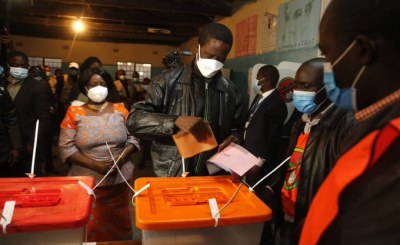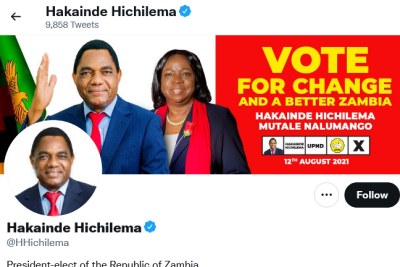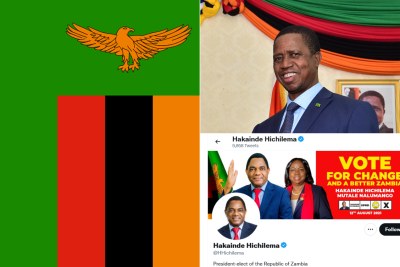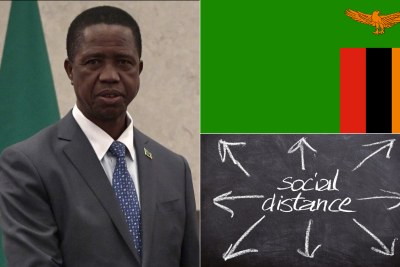-
Zambia: Three Lessons From Landslide Opposition Victory
African Arguments, 22 August 2021
How did voters, the opposition and civil society manage to defeat an entrenched and repressive regime? Read more »
-
Zambia: President Elect-Hakainde Hichilema Faces Huge Task of Reviving Zambia's Economy
Nation, 21 August 2021
Zambia's President- elect Hakainde Hichilema will have his work cut out as he takes office next Tuesday, following his landslide victory against the incumbent Edgar Lungu. Read more »
-
Zambia: Why Edgar Lungu and His Party Lost 2021 Elections
The Conversation Africa, 22 August 2021
Hakainde Hichilema's election victory is the third time an opposition leader has unseated an incumbent president in Zambia since 1991. The victory bequeaths on the new president… Read more »
-
Africa: Africa Has Come of Age
New Era, 20 August 2021
A new wind of change is blowing in neighbouring Zambia following Hakainde Hichilema's election as incoming president. The business tycoon and opposition leader, at his sixth… Read more »
-
Zambia: Expectations High
Times of Zambia, 20 August 2021
EXPECTATIONS will surely be high among sports associations as President-Elect Hakainde Hichilema takes over office with hope that his new government will bring the much needed… Read more »
-
Zambia: Zambia Elections - Six Lessons for African Electoral Democracy
Daily Maverick, 19 August 2021
In 2021, Africa witnessed some elections characterised by procedural uncertainty and outcome certainty. Fortunately, Zambia bucked the trend. There were important reasons why. Read more »
-
Zimbabwe: Hichilema Is Not Chamisa, Zambia Is Not Zimbabwe
The Herald, 20 August 2021
Correspondent Read more »
Lessons From Zambia's Election For Rest of Africa
Zambia's President-elect Hakainde Hichilema, 59, will take office on August 31, 2021, following his landslide victory against incumbent Edgar Lungu. Hichilema won with over 60% of the vote and is seen as the electorate's reaction to the incumbent's economic mismanagement and the authoritarian leadership in the southern African country.
The most obvious lesson from Zambia is that economic crisis can undermine the hold on power of genuinely repressive regimes. This might seem obvious, but the focus on ethnic, regional, or racial voting in Africa has often obscured the extent to which people vote, on the economy. Swing voters are more likely to line up behind the opposition, and ruling party supporters are most likely to stay at home, when they blame the government for economic pain.
For the third time in the country's history, power changed hands via the ballot box - not just democratically but peacefully. Along with Malawi, Zambia is now leading the way as one of a very small number of countries to move away from authoritarianism during the novel coronavirus pandemic, write Sishuwa Sishuwa and Nic Cheeseman for African Arguments.
InFocus
-
Opposition leader Hakainde Hichilema has been declared the winner of Zambia's presidential election, defeating incumbent Edgar Lungu, Al Jazee Read more »
-
Zambian president-elect Hakainde Hichilema has told Zambians 'change is here' as opposition parties in neighbouring countries congratulated him on his victory. UPND supporters that ... Read more »
-
General elections will be held in Zambia on August 12, 2021 to elect the president and national assembly. A total of sixteen candidates registered to run for the top job but it is ... Read more »
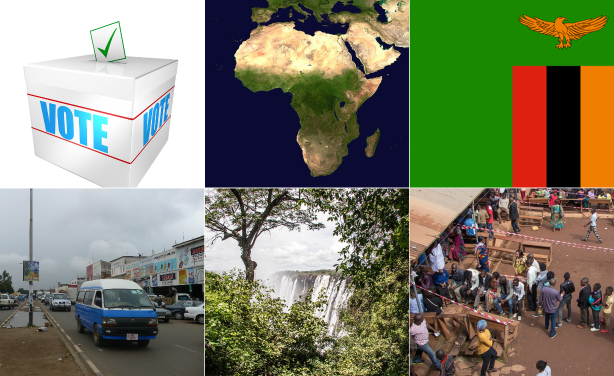
Zambia flag, top right, Lusaka street, Victor Falls-Zambia side, polling station
